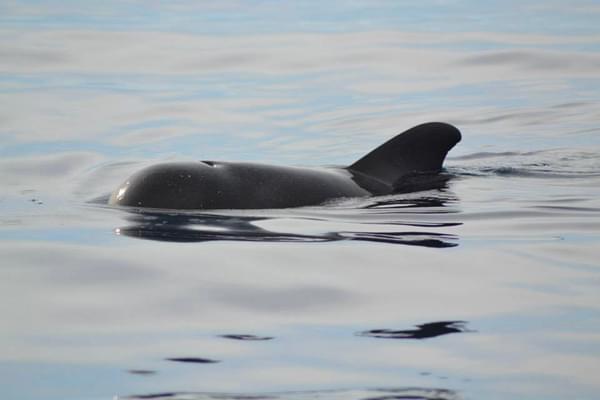Whale strandings in the South of England are not rare but not common either. But for three episodes to all occur within a few days of each other is puzzlingly unusual.
On Monday September 30, as many as 11 pilot whales stranded on remote and inaccessible mudflats off the Isle of Sheppey in the Swale Estuary, North Kent. When the whales were finally reached on Tuesday morning, one was already dead, and three others died later that afternoon. A further three were confirmed dead on Wednesday and another two could not be reached. Just two of the original 11 were subsequently seen having refloated themselves.
On Sunday October 6, across the Thames Estuary in Canvey Island, Essex, a female pilot whale and her calf stranded in the shallow and narrow Oyster Creek, just off Canvey Island. Despite valiant efforts, both whales were euthanised.
ORCA Ocean Conservationist Rosie Barrett, who was called to the scene, said in a Facebook post that she was devastated. She said that large whales were rarely seen along the coast of Essex.
Rosie said: ‘I knew it was unlikely to be a good result as pilot whales are notoriously difficult because they tend to strand in numbers and all animals have to go out together otherwise they will continue to re-strand due to their tight family bonds.’
‘The teams involved worked really, really hard but sadly it wasn’t the result we had all hoped for with both individuals dying. It’s really frustrating to see comments on public posts about how the situation should have been dealt with and how we could have done better.’
‘No-one wants this outcome! But rescuing and refloating a large cetacean isn’t easy like some seem to think. Where they were was a very difficult location for them to be rescued. I am heartbroken. I just really wish it could have been a better outcome. Devastated.’
Again on Sunday, but this time on the south coast of the Isle of Wight, a stranded and injured pilot whale was found by a dog-walker on an isolated beach. As with all the other responses, valiant efforts by British Divers Marine Life Rescue (BDMLR) to refloat the whale were unsuccessful and it was also put to sleep.
As is the case with just about all strandings, there is as much possibility that these were in some way connected as they were an unhappy coincidence. However, their close geographical proximity within such a short space of time and at three separate locations is both unusual and puzzling.
Main photo credit - Rhian Grey

ORCA's work to protect whales and dolphins has never been more important and to help safeguard these amazing animals for the future we need your help. Please support our work by donating at www.orca.org.uk/donate to help us create oceans alive with whales and dolphins

